Salvatore Riina
Murder Book and The I-94 Murders are now on sale at
Audible
, and it will be available on iTunes and Amazon within the next few days.  Actor Jonathan Strait is the reader on the audio versions of Murder Book and The I-94 Murders. I auditioned a variety of readers, and Jonathan is outstanding. He enjoys the thrillers, he researches the material and he understands how the books should be read. Jonathan Strait is impressive!
Actor Jonathan Strait is the reader on the audio versions of Murder Book and The I-94 Murders. I auditioned a variety of readers, and Jonathan is outstanding. He enjoys the thrillers, he researches the material and he understands how the books should be read. Jonathan Strait is impressive!
Thank you for the rush of preorders for Lying Close! I will be receiving a second shipment by the end of this week and will be sending out the remaining preorders. Order your copy here!
Possible Burning Bridges cover:
 Do you want to hear about a terrible person? Mob boss: Salvatore Riina
Do you want to hear about a terrible person? Mob boss: Salvatore Riina 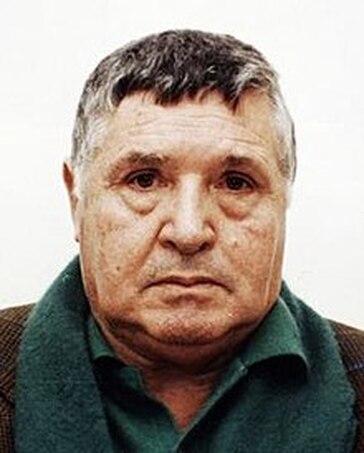 Mugshot of Totò Riina after his arrest in 1993 Born
Mugshot of Totò Riina after his arrest in 1993 Born
November 16, 1930 in Corleone, Sicily, Italy
Died
November 17, 2017 (aged 87)
Occupation
Mafia boss of the Corleone family
Conviction(s)
Mafia association, Multiple murders
Penalty
26 Life Sentences
Salvatore Riina is believed to the basis of the Godfather movies. Riina is an example of how real life killers and mobsters can be worse than the movies. Riina was the mob boss who ordered the bombing of Train 904 on December 23, 1984. He maximized the number of casualties by catching travelers headed home for Christmas, and having the bomb detonate while the train was in a tunnel.
And you want to know why he did it? To create a distraction. Riina was concerned over his mob being investigated, and wanted to try to get numerous investigators reassigned by faking a terrorist attack. The train was five miles into a tunnel and moving 93 miles an hour when the bomb was detonated. 16 people died and 266 people were wounded. Its shock wave, reflected by the tunnel sides, blew out all the window glass and internal doors, blasting shrapnel shards into the compartments. The passengers were scared and stranded in darkness, in the cold Apennine winter.
Riina was called "Totò the Short," “The Beast,” and “The Boss of Bosses.” Riina was an Italian mobster and head of the Sicilian Mafia, the Corleone family. Riina is known for a ruthless murder campaign that reached a peak in the early 1990s with the assassinations of Antimafia Commission prosecutors Giovanni Falcone and Paolo Borsellino, resulting in widespread public outcry and a major crackdown by the authorities.
In violation of established Mafia codes, Riina advocated the killing of women and children, and killed blameless members of the public, solely to distract law enforcement agencies. Hitman Giovanni Brusca estimated he murdered between 100 and 200 people on behalf of Riina. Although this scorched-earth policy neutralized any internal threat to Riina's position, he brought his organization into open confrontation with the state. Prior to Riina’s reign of power, many people in Sicily didn’t believe the mafia was real-- instead simply an urban legend. After Riina’s arrest in 1993, he ordered bombings of churches and art museums. He died in 2017, and never repented.
Growing up in Corleone:
Salvatore Riina was raised in poverty in Palermo, Italy. His father died after finding an unexploded bomb and taking it apart to sell as scrap metal. The bomb exploded, killing his father and 7-year-old brother. At the age of 19, Riina told his uncle he wanted to join the mob, so his uncle had him strangle to death a tied-up man with his bare hands to prove he was ready. Riina was sentenced to 12 years in prison, at 19, for killing a man during a fight. He was released in 1956.
The head of the Mafia family in Corleone was Michele Navarra until 1958, when he was shot dead on the orders of Luciano Leggio, a ruthless 33-year-old Mafioso, who subsequently became the new boss. (Luciano Leggioi is pictured below.)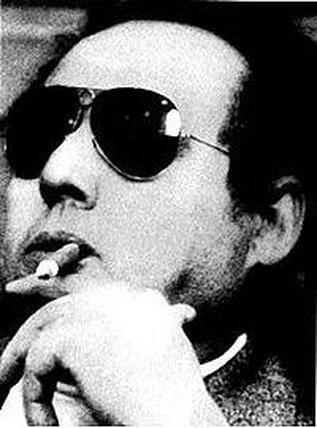 Riina, Leggio and Provenzano spent Riina’s post prison years hunting down and killing dozens of Navarra's supporters. The three were forced to go into hiding due to warrants. Riina and Leggio were arrested and tried in 1969 for murders carried out in the early 1960’s. They were acquitted because of intimidation of the jurors and witnesses. Riina went into hiding later that year, after he was indicted on another murder charge. Riina remained a fugitive for the next 23 years.
Riina, Leggio and Provenzano spent Riina’s post prison years hunting down and killing dozens of Navarra's supporters. The three were forced to go into hiding due to warrants. Riina and Leggio were arrested and tried in 1969 for murders carried out in the early 1960’s. They were acquitted because of intimidation of the jurors and witnesses. Riina went into hiding later that year, after he was indicted on another murder charge. Riina remained a fugitive for the next 23 years.
When Luciano Leggio was arrested in 1974, for the 1958 murder of Navarra, Salvotore Riina became the head of the Corleonesi. The Corleonesi's primary rivals were Stefano Bontade, Salvatore Inzerillo and Tano Badalamenti, bosses of various powerful Palermo Mafia families. Between 1981 and 1983, the Second Mafia War was instigated by Riina. Bontade and Inzerillo, together with many associates and members of both their Mafia and blood families, were killed. There were up to a thousand killings during this period as Riina and the Corleonesi, together with their allies, wiped out their rivals. By the end of the war, the Corleonesi were effectively ruling the Mafia. Over the next few years, Riina increased his influence by eliminating the Corleonesi's allies, such as Filippo Marchese, Giuseppe Greco and Rosario Riccobono.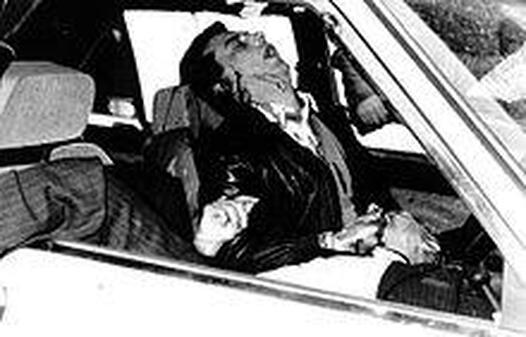 The bodies of Pio La Torre and Rosario Di Salvo, murdered by the Mafia
The bodies of Pio La Torre and Rosario Di Salvo, murdered by the Mafia
Riina’s predecessors kept a low profile, leading some in law enforcement to question the very existence of the Mafia. Riina ordered the murders of judges, policemen and prosecutors in an attempt to terrify the authorities. A law to create a new offence of Mafia association and confiscate Mafia assets was introduced by Pio La Torre, secretary of the Italian Communist Party in Sicily. La Torre was murdered on April 30, 1982. In May of 1982, the Italian government sent Carlo Alberto Dalla Chiesa to Sicily, with orders to crush the Mafia. However, not long after arriving, on September 3, 1982, he was gunned down in the city centre with his wife, Emanuela Setti Carraro, and his driver bodyguard, Domenico Russo.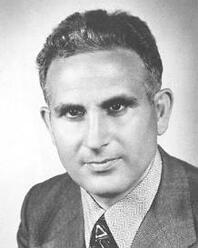 Pio La Torre
Pio La Torre 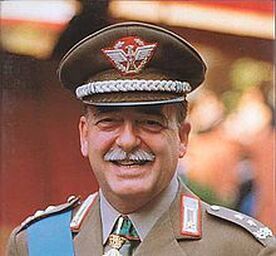 Carlo Alberto Dalla Chiesa
Carlo Alberto Dalla Chiesa 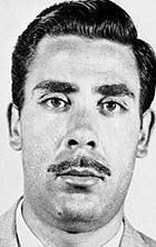 Thomaso Buscetta
Thomaso Buscetta
On September 11, 1982, mafioso Thomaso Buscetta's sons, Benedetto and Antonio, disappeared, never to be found again, which prompted his collaboration with Italian authorities. (During a trial in 1993, the Mafia member Salvatore Cancemi confessed to Buscetta that he had strangled two of Buscetta's sons to death. After the trial, Buscetta embraced Cancemi and said: "You could not refuse the order. I forgive you because I know what it means to be in Cosa Nostra.) This was followed by the deaths of his brother Vincenzo, son-in-law Giuseppe Genova, brother-in-law Pietro and four of his nephews, Domenico and Benedetto Buscetta, and Orazio and Antonio D'Amico. So when Buscetta was arrested he asked to talk to the anti-Mafia judge Giovanni Falcone, and began his life as an informant, a pentito .
Thomaso Buscetta was the first high-profile Sicilian Mafiosi to become an informant. Italy built a bunker in the basement of a prison in Sicily to hold the trials to protect the judges, prosecutors and juries. Buscetta helped judges Falcone and Paolo Borsellino achieve success in the fight against organized crime that led to 475 Mafia members indicted, and 338 convicted in the Maxi Trial.
In an attempt to divert investigative resources away from Buscetta's key revelations, Salvatore Riina ordered a terrorist-style atrocity, the December 23, 1984 Train 904 bombing. It became known as the "Christmas Massacre" and was initially attributed to political extremists. It was several years later, when police discovered the same type of explosives used in Train 904 while searching a mafia hideout, that it became apparent the Mafia had been behind the attack.
Riina was not done destroying families:
As part of the Maxi Trial, Salvatore Riina was given two life sentences in absentia. Riina pinned his hopes on the lengthy appeal process, and he suspended the campaign of murders against officials while the cases went to higher courts. When the convictions were upheld by the Supreme Court in January 1992, Riina reacted by ordering the assassination of Politician Salvatore Lima and Judge Giovanni Falcone.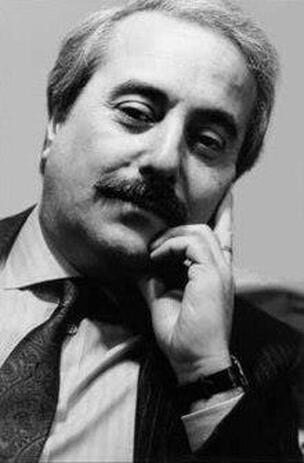 Judge Giovanni Falcone
Judge Giovanni Falcone  Parliament member: Salvatore Lima
Parliament member: Salvatore Lima
On May 23, 1992, Falcone, his wife Francesca Morvillo and three police officers died in the Capaci bombing outside Palermo. Two months later, Borsellino was killed along with five police officers in the entrance to his mother's apartment block by a car bomb. Ignazio Salvo, who had advised Riina against killing Falcone, was himself murdered on September 17,1992. The public was outraged, both at the Mafia and also the politicians who failed to protect Falcone and Borsellino. The Italian government arranged for a massive crackdown against the Mafia in response.
The bizarre morality of the Mafia:
The large killing of innocents was acceptable, but leaving your family was not.
Salvatore Riina reprimanded Balduccio Di Maggio, an ambitious Mafioso for leaving his wife and children for a mistress, telling him he would never be made a full boss. Knowing Riina would order the death of subordinates whom he considered unreliable, Di Maggio fled Sicily and collaborated with the authorities. At the entrance to a complex of villas, Di Maggio identified Riina's wife. On January 15, 1993, Salvatore Riina was arrested at his villa in Palermo. He had been a fugitive for 23 years.
Riina continued to order Terror attacks from prison:
After Riina was captured in January 1993, numerous terror attacks were ordered as a warning to its members to not turn state's witness. On May 14, 1993, television host Maurizio Costanzo, who had expressed delight at the arrest of Riina, was almost killed by a bomb as he drove down a Rome street; 23 people were injured. The explosion was part of a series. On May 27, 1993, a bomb under the Florence Torre dei Pulci killed five people: Fabrizio Nencini and his wife Angelamaria; their daughters, nine-year-old Nadia and two-month-old Caterina; and Dario Capolicchio, aged 20. Thirty-three people were injured. Attacks on art galleries and churches left ten dead and many injured, causing outrage among Italians.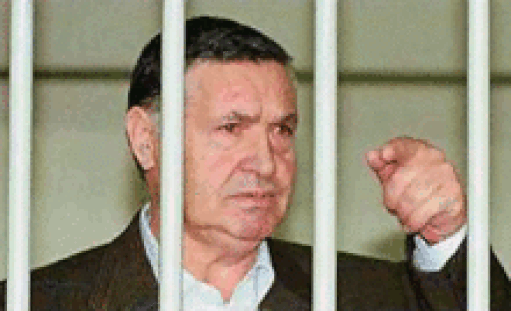 Riina behind bars in court after his arrest in 1993
Riina behind bars in court after his arrest in 1993
Riina was held in a maximum-security prison in Parma with limited contact with the outside world in order to prevent him from running his organization from behind bars. It is suspected that he got orders out through guards. Over $125,000,000 in assets were confiscated from Riina, and his vast mansion was also acquired by the crusading anti-Mafia mayor of Corleone in 1997. The mansion was subsequently converted into a police office and opened in 2015.
Two of Riina’s sons, Giovanni and Giuseppe, followed in their father's footsteps and were imprisoned. In November 2001, a court in Palermo sentenced 24-year-old Giovanni to life in prison for four murders. The story is that Riina had his son commit his first murder at 17, to break him in to the mafia. On December 31, 2004, Riina's youngest son, Giuseppe, was sentenced in June 2002, to 14 years for various crimes, including Mafia association, extortion and money laundering. He was found to have established Mafia-controlled companies to hide money from protection rackets, drug-trafficking and tenders for public building contracts on the island.
All bad things must end…
Salvatore Riina died on November 17, 2017, after his 87th birthday, in the prison unit of the Maggiore Hospital in Parma. At the time of his death, he was still considered to be the head of the Cosa Nostra. Riina was refused a public funeral by the church. He was privately buried in his hometown of Corleone.
Who are the heroes? Journalists led the attack on the mafia, and people paid with their lives for it. Prosecutors, judges, juries all took a huge risk in convicting mafia members. Despite the cruelty, there were people willing to stand up for morality and they are deserving of our utmost respect. Thank you!
And thanks for listening,
Frank
For more information on Salvatore Riina you may wish to check out the Wine & Crime podcast.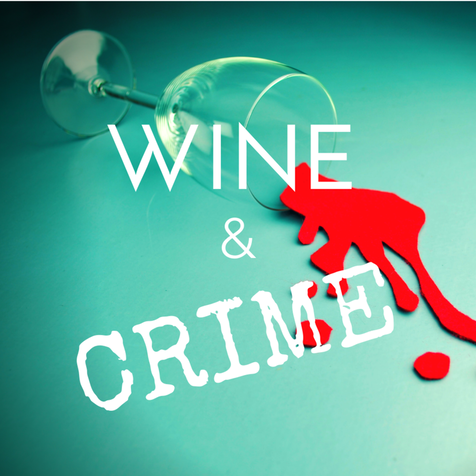
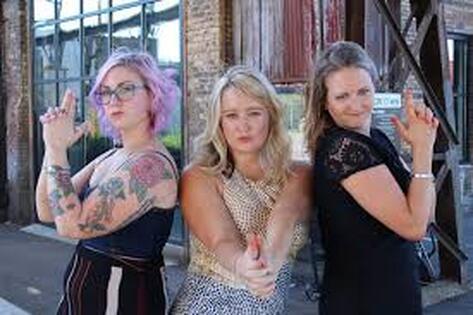 One of my very favorite musicians died of a heroin overdose last week at age 38—Justin Townes Earle. He was the son of Steve Earle.
One of my very favorite musicians died of a heroin overdose last week at age 38—Justin Townes Earle. He was the son of Steve Earle.
Thank you for the great music Justin!
 Actor Jonathan Strait is the reader on the audio versions of Murder Book and The I-94 Murders. I auditioned a variety of readers, and Jonathan is outstanding. He enjoys the thrillers, he researches the material and he understands how the books should be read. Jonathan Strait is impressive!
Actor Jonathan Strait is the reader on the audio versions of Murder Book and The I-94 Murders. I auditioned a variety of readers, and Jonathan is outstanding. He enjoys the thrillers, he researches the material and he understands how the books should be read. Jonathan Strait is impressive!Thank you for the rush of preorders for Lying Close! I will be receiving a second shipment by the end of this week and will be sending out the remaining preorders. Order your copy here!

Possible Burning Bridges cover:
 Do you want to hear about a terrible person? Mob boss: Salvatore Riina
Do you want to hear about a terrible person? Mob boss: Salvatore Riina  Mugshot of Totò Riina after his arrest in 1993 Born
Mugshot of Totò Riina after his arrest in 1993 BornNovember 16, 1930 in Corleone, Sicily, Italy
Died
November 17, 2017 (aged 87)
Occupation
Mafia boss of the Corleone family
Conviction(s)
Mafia association, Multiple murders
Penalty
26 Life Sentences
Salvatore Riina is believed to the basis of the Godfather movies. Riina is an example of how real life killers and mobsters can be worse than the movies. Riina was the mob boss who ordered the bombing of Train 904 on December 23, 1984. He maximized the number of casualties by catching travelers headed home for Christmas, and having the bomb detonate while the train was in a tunnel.
And you want to know why he did it? To create a distraction. Riina was concerned over his mob being investigated, and wanted to try to get numerous investigators reassigned by faking a terrorist attack. The train was five miles into a tunnel and moving 93 miles an hour when the bomb was detonated. 16 people died and 266 people were wounded. Its shock wave, reflected by the tunnel sides, blew out all the window glass and internal doors, blasting shrapnel shards into the compartments. The passengers were scared and stranded in darkness, in the cold Apennine winter.
Riina was called "Totò the Short," “The Beast,” and “The Boss of Bosses.” Riina was an Italian mobster and head of the Sicilian Mafia, the Corleone family. Riina is known for a ruthless murder campaign that reached a peak in the early 1990s with the assassinations of Antimafia Commission prosecutors Giovanni Falcone and Paolo Borsellino, resulting in widespread public outcry and a major crackdown by the authorities.
In violation of established Mafia codes, Riina advocated the killing of women and children, and killed blameless members of the public, solely to distract law enforcement agencies. Hitman Giovanni Brusca estimated he murdered between 100 and 200 people on behalf of Riina. Although this scorched-earth policy neutralized any internal threat to Riina's position, he brought his organization into open confrontation with the state. Prior to Riina’s reign of power, many people in Sicily didn’t believe the mafia was real-- instead simply an urban legend. After Riina’s arrest in 1993, he ordered bombings of churches and art museums. He died in 2017, and never repented.
Growing up in Corleone:
Salvatore Riina was raised in poverty in Palermo, Italy. His father died after finding an unexploded bomb and taking it apart to sell as scrap metal. The bomb exploded, killing his father and 7-year-old brother. At the age of 19, Riina told his uncle he wanted to join the mob, so his uncle had him strangle to death a tied-up man with his bare hands to prove he was ready. Riina was sentenced to 12 years in prison, at 19, for killing a man during a fight. He was released in 1956.
The head of the Mafia family in Corleone was Michele Navarra until 1958, when he was shot dead on the orders of Luciano Leggio, a ruthless 33-year-old Mafioso, who subsequently became the new boss. (Luciano Leggioi is pictured below.)
 Riina, Leggio and Provenzano spent Riina’s post prison years hunting down and killing dozens of Navarra's supporters. The three were forced to go into hiding due to warrants. Riina and Leggio were arrested and tried in 1969 for murders carried out in the early 1960’s. They were acquitted because of intimidation of the jurors and witnesses. Riina went into hiding later that year, after he was indicted on another murder charge. Riina remained a fugitive for the next 23 years.
Riina, Leggio and Provenzano spent Riina’s post prison years hunting down and killing dozens of Navarra's supporters. The three were forced to go into hiding due to warrants. Riina and Leggio were arrested and tried in 1969 for murders carried out in the early 1960’s. They were acquitted because of intimidation of the jurors and witnesses. Riina went into hiding later that year, after he was indicted on another murder charge. Riina remained a fugitive for the next 23 years.When Luciano Leggio was arrested in 1974, for the 1958 murder of Navarra, Salvotore Riina became the head of the Corleonesi. The Corleonesi's primary rivals were Stefano Bontade, Salvatore Inzerillo and Tano Badalamenti, bosses of various powerful Palermo Mafia families. Between 1981 and 1983, the Second Mafia War was instigated by Riina. Bontade and Inzerillo, together with many associates and members of both their Mafia and blood families, were killed. There were up to a thousand killings during this period as Riina and the Corleonesi, together with their allies, wiped out their rivals. By the end of the war, the Corleonesi were effectively ruling the Mafia. Over the next few years, Riina increased his influence by eliminating the Corleonesi's allies, such as Filippo Marchese, Giuseppe Greco and Rosario Riccobono.
 The bodies of Pio La Torre and Rosario Di Salvo, murdered by the Mafia
The bodies of Pio La Torre and Rosario Di Salvo, murdered by the Mafia Riina’s predecessors kept a low profile, leading some in law enforcement to question the very existence of the Mafia. Riina ordered the murders of judges, policemen and prosecutors in an attempt to terrify the authorities. A law to create a new offence of Mafia association and confiscate Mafia assets was introduced by Pio La Torre, secretary of the Italian Communist Party in Sicily. La Torre was murdered on April 30, 1982. In May of 1982, the Italian government sent Carlo Alberto Dalla Chiesa to Sicily, with orders to crush the Mafia. However, not long after arriving, on September 3, 1982, he was gunned down in the city centre with his wife, Emanuela Setti Carraro, and his driver bodyguard, Domenico Russo.
 Pio La Torre
Pio La Torre  Carlo Alberto Dalla Chiesa
Carlo Alberto Dalla Chiesa  Thomaso Buscetta
Thomaso Buscetta On September 11, 1982, mafioso Thomaso Buscetta's sons, Benedetto and Antonio, disappeared, never to be found again, which prompted his collaboration with Italian authorities. (During a trial in 1993, the Mafia member Salvatore Cancemi confessed to Buscetta that he had strangled two of Buscetta's sons to death. After the trial, Buscetta embraced Cancemi and said: "You could not refuse the order. I forgive you because I know what it means to be in Cosa Nostra.) This was followed by the deaths of his brother Vincenzo, son-in-law Giuseppe Genova, brother-in-law Pietro and four of his nephews, Domenico and Benedetto Buscetta, and Orazio and Antonio D'Amico. So when Buscetta was arrested he asked to talk to the anti-Mafia judge Giovanni Falcone, and began his life as an informant, a pentito .
Thomaso Buscetta was the first high-profile Sicilian Mafiosi to become an informant. Italy built a bunker in the basement of a prison in Sicily to hold the trials to protect the judges, prosecutors and juries. Buscetta helped judges Falcone and Paolo Borsellino achieve success in the fight against organized crime that led to 475 Mafia members indicted, and 338 convicted in the Maxi Trial.
In an attempt to divert investigative resources away from Buscetta's key revelations, Salvatore Riina ordered a terrorist-style atrocity, the December 23, 1984 Train 904 bombing. It became known as the "Christmas Massacre" and was initially attributed to political extremists. It was several years later, when police discovered the same type of explosives used in Train 904 while searching a mafia hideout, that it became apparent the Mafia had been behind the attack.
Riina was not done destroying families:
As part of the Maxi Trial, Salvatore Riina was given two life sentences in absentia. Riina pinned his hopes on the lengthy appeal process, and he suspended the campaign of murders against officials while the cases went to higher courts. When the convictions were upheld by the Supreme Court in January 1992, Riina reacted by ordering the assassination of Politician Salvatore Lima and Judge Giovanni Falcone.
 Judge Giovanni Falcone
Judge Giovanni Falcone  Parliament member: Salvatore Lima
Parliament member: Salvatore Lima On May 23, 1992, Falcone, his wife Francesca Morvillo and three police officers died in the Capaci bombing outside Palermo. Two months later, Borsellino was killed along with five police officers in the entrance to his mother's apartment block by a car bomb. Ignazio Salvo, who had advised Riina against killing Falcone, was himself murdered on September 17,1992. The public was outraged, both at the Mafia and also the politicians who failed to protect Falcone and Borsellino. The Italian government arranged for a massive crackdown against the Mafia in response.
The bizarre morality of the Mafia:
The large killing of innocents was acceptable, but leaving your family was not.
Salvatore Riina reprimanded Balduccio Di Maggio, an ambitious Mafioso for leaving his wife and children for a mistress, telling him he would never be made a full boss. Knowing Riina would order the death of subordinates whom he considered unreliable, Di Maggio fled Sicily and collaborated with the authorities. At the entrance to a complex of villas, Di Maggio identified Riina's wife. On January 15, 1993, Salvatore Riina was arrested at his villa in Palermo. He had been a fugitive for 23 years.
Riina continued to order Terror attacks from prison:
After Riina was captured in January 1993, numerous terror attacks were ordered as a warning to its members to not turn state's witness. On May 14, 1993, television host Maurizio Costanzo, who had expressed delight at the arrest of Riina, was almost killed by a bomb as he drove down a Rome street; 23 people were injured. The explosion was part of a series. On May 27, 1993, a bomb under the Florence Torre dei Pulci killed five people: Fabrizio Nencini and his wife Angelamaria; their daughters, nine-year-old Nadia and two-month-old Caterina; and Dario Capolicchio, aged 20. Thirty-three people were injured. Attacks on art galleries and churches left ten dead and many injured, causing outrage among Italians.
 Riina behind bars in court after his arrest in 1993
Riina behind bars in court after his arrest in 1993 Riina was held in a maximum-security prison in Parma with limited contact with the outside world in order to prevent him from running his organization from behind bars. It is suspected that he got orders out through guards. Over $125,000,000 in assets were confiscated from Riina, and his vast mansion was also acquired by the crusading anti-Mafia mayor of Corleone in 1997. The mansion was subsequently converted into a police office and opened in 2015.
Two of Riina’s sons, Giovanni and Giuseppe, followed in their father's footsteps and were imprisoned. In November 2001, a court in Palermo sentenced 24-year-old Giovanni to life in prison for four murders. The story is that Riina had his son commit his first murder at 17, to break him in to the mafia. On December 31, 2004, Riina's youngest son, Giuseppe, was sentenced in June 2002, to 14 years for various crimes, including Mafia association, extortion and money laundering. He was found to have established Mafia-controlled companies to hide money from protection rackets, drug-trafficking and tenders for public building contracts on the island.
All bad things must end…
Salvatore Riina died on November 17, 2017, after his 87th birthday, in the prison unit of the Maggiore Hospital in Parma. At the time of his death, he was still considered to be the head of the Cosa Nostra. Riina was refused a public funeral by the church. He was privately buried in his hometown of Corleone.
Who are the heroes? Journalists led the attack on the mafia, and people paid with their lives for it. Prosecutors, judges, juries all took a huge risk in convicting mafia members. Despite the cruelty, there were people willing to stand up for morality and they are deserving of our utmost respect. Thank you!
And thanks for listening,
Frank
For more information on Salvatore Riina you may wish to check out the Wine & Crime podcast.

 One of my very favorite musicians died of a heroin overdose last week at age 38—Justin Townes Earle. He was the son of Steve Earle.
One of my very favorite musicians died of a heroin overdose last week at age 38—Justin Townes Earle. He was the son of Steve Earle.Thank you for the great music Justin!
Published on September 01, 2020 11:01
No comments have been added yet.



